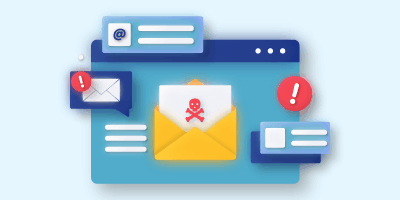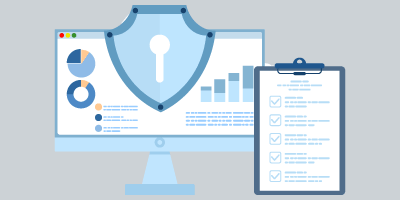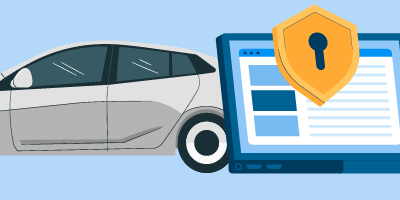In previous blog posts, we have talked about ways to make your eCommerce store stand out and dived into WooCommerce, an eCommerce platform for WordPress. But, along with design and functionality, security plays a big role in the success of an eCommerce website. So, as we celebrate Cybersecurity Awareness Month, we wanted to emphasize the importance of eCommerce security.
The rise of online shopping has enhanced convenience for customers, but it has also made eCommerce stores an attractive target for cyberattacks like malware. This is because eCommerce transactions involve the exchange of confidential, and often lucrative, customer information, such as credit card data. So, eCommerce website owners cannot afford to take security lightly. In this blog post, we look at common cyber threats to eCommerce websites and 10 best practices you can implement to safeguard your online store.
why is eCommerce security so important?
Today, the eCommerce industry is booming as more and more customers shop online. Here are some interesting statistics that speak to the strength of the eCommerce market.
- 34% of shoppers shop online at least once a week.
- By 2027, the e-commerce market is expected to total over $7.9 trillion.
With so many transactions taking place on eCommerce websites that include the exchange of sensitive customer data, it’s extremely important for owners to be proactive about security. A successful security breach can seriously hinder your ability to do business – it can bring down your website for days, maybe weeks, which can hurt sales.
Besides the financial hit, a successful attack can also undermine customer trust in your brand. Customers are less likely to return to your website once they know it’s been hacked, which can cause further financial damage to your business.
To protect your eCommerce business, maintain customer trust, and remain compliant with regulations, it’s important to implement measures that safeguard your online store from cyber threats.
5 common cyber threats that affect eCommerce stores
Malware
Malware attacks, such as ransomware, can damage or restrict access to your eCommerce website. Once your website is infected, hackers can block access to the store unless you pay a ransom. They can also steal sensitive data, such as customers’ payment information.
Cross-site scripting (XSS)
DDoS attacks
Distributed denial of service (DDoS) attacks are malicious efforts to break your eCommerce website, rendering your site or services inaccessible to users. In this type of attack, hackers overload your server with illegitimate traffic. Consequences of a DDoS attack include both financial and reputation damage.
Brute force attack
In brute force attacks, hackers attempt to breach a user account by trying different passwords until they discover the right one. Weak passwords are one of the main reasons for the success of a brute force attack. Once a hacker breaks into a user account, they can access sensitive company data, carry out a wider breach if that user is reusing passwords across accounts, or even make fraudulent transactions.
SQL injection
These cyberattacks target web applications that use SQL databases. Hackers use malicious SQL code to manipulate queries to the database and gain access to sensitive data. For instance, attackers can carry out SQL injection attacks by compromising a server’s cookies or web forms.
10 eCommerce security best practices to protect your online store
Choose a secure web host and eCommerce platform
A good web hosting provider combined with a robust eCommerce platform will provide the secure infrastructure you need to keep customer data safe while delivering a seamless shopping experience. GraVoc leverages WP Engine and WooCommerce to build secure online stores for our eCommerce clients.
Ensure compliance with PCI-DSS
Even if you outsource web hosting or leverage a third-party payment service provider, you still hold some responsibility to ensure payment card data is secure under PCI compliance guidelines. Non-compliance with PCI-DSS can lead to fines and other penalties in the event of a breach.
Implement SSL Certificate
Keep your website software up to date
Regularly updating your website is one of the simplest yet most effective ways to maintain security. For instance, outdated plugins and themes are some of the most common entry points for malware distribution in WordPress. Updates for themes, plugins, and core software often include security patches for newly discovered vulnerabilities that hackers could exploit. So, keep your content management system (CMS), plugins, and theme files up to date to mitigate any vulnerabilities.
Conduct regular vulnerability assessments
Secure user login with strong passwords and MFA
Using strong passwords combined with Multi-Factor Authentication (MFA) can improve user login security.
Weak passwords are one of the major causes of cyberattacks such as brute force attacks and credential stuffing. Leveraging password managers or single sign-on (SSO) tools can help combat password fatigue and reduce the burden on employees and users to remember multiple passwords or generate unique passwords. Ultimately, this will encourage your employees and users to create more secure passwords.
Use a firewall
A firewall acts as a barrier that protects your eCommerce website by blocking malicious traffic. This way, a firewall acts as an additional layer of defense to secure your online store and mitigate the risks of attacks like DDoS.
Back up your web data
If you do face a security incident, having an up-to-date backup of your eCommerce store’s data makes the recovery process a little easier and helps support business continuity. Without a secure backup, you may find it more challenging to restore your website and you could lose critical data.
Conduct security awareness training for employees
Human error is often a major vulnerability in cybersecurity, which makes employee security awareness training vital. Through regular security awareness training, you can educate employees on how to spot and mitigate cyber threats, empowering them to defend your eCommerce store.
let’s talk about eCommerce security services!
GraVoc offers a host of security services for eCommerce businesses, including PCI-DSS compliance services, cybersecurity services, and tiered WordPress Hosting & Maintenance Plans to help keep your online store and customer data safe. Check out our services below or contact us today to get started!
Related articles
Business Email Compromise: Top BEC Tactics & How to Protect Against Them
We take a look at Business Email Compromise, including common BEC tactics and what your business can do to protect against them.
FFIEC CAT Sunset: Why the CRI Profile is a Strong Alternative
With the FFIEC CAT sunset approaching, we explore why the CRI Profile is a strong alternative to the CAT for financial institutions!
FTC Safeguards Rule Compliance for Auto Dealerships
We’ll go over the FTC Safeguards Rule, what it requires, and how a managed service provider can help auto dealerships stay compliant.





